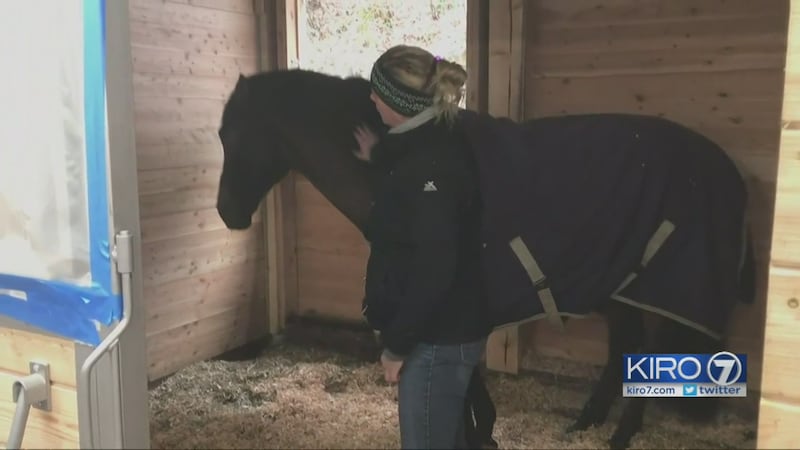WOODINVILLE, Wash. — A deadly virus has killed seven horses at a King County equestrian center, but the horse community is stepping up to help.
Gold Creek Equine Center in Woodinville is dealing with an outbreak of the Equine Herpesvirus Type 1, or EHV-1 – a strain that doesn’t respond to vaccines.
The Washington State Department of Agriculture's veterinarian, Dr. Brian Joseph, says the virus is “incredibly contagious” and can even be spread by car tires or someone tracking it with their shoes.
One of Gold Creek’s co-owners, Mike Adams, says the center is working closely with Joseph.
“Unfortunately, this is an extremely contagious virus. But we're doing everything we can possibly do to protect each of the horses here and the entire community,” Adams said.
Scroll down to continue reading
Trending headlines
- 'Cash Me Outside' teen pays off mom's mortgage for Christmas
- Report: Amazon, Microsoft workers caught hiring sex workers using company email
- Police: Arizona infant bent in half by father has died
- Overturned crane causes closure, backups on I-5
- Grandma grabs gun, runs off would-be Christmas Eve intruder
- Flying to work cheaper for Seattle tech worker whose job is in Bay Area
Because of the quarantine, KIRO 7 cameras were not allowed past a fence that perimeters the property, but a trainer helped take cellphone video to show what the facility is going through.
Horse owners and staff must wear hazmat suits to check on horses. They spray down stalls with bleach and disinfect shoes, and even car tires before leaving. Sick and healthy horses are separated from the healthy ones by tarps.
The WSDA is working closely with Gold Creek. Joseph says though the EHV-1 virus is common, the “neurological strain” that broke out at Gold Creek is rare in Washington State.
It causes high fever, fatigue, weak legs and difficulty urinating.
“It’s very scary. They (the owners) have been living through a nightmare for over a week now; there's been some loss of life,” said Brooke Bendzak, who used to train at Gold Creek. She stopped by the facility Wednesday to drop off donations.
Seven horses have been euthanized since the first case was discovered Dec.13.
“Horses are a key part of our family. And when you see your family sick, and you actually lose some of them, it’s a terrible time,” Adams said.
The WSDA’s veterinarian says the virus can stay dormant in horses for years -- only emerging after stress.
He says an outbreak can happen at any time, at any facility.
Lisa Clarke’s horse, Ladye Bug, got sick but likely will recover.
“It’s been terrifying,” Clarke said. “A lot of hugging, a lot of crying, but as horse owners, you know, stuff can happen. They're big animals, and with big animals, big troubles come,” she said.
In this tough time, Gold Creek is getting help. There's a GoFundMe set up to help cover vet costs, set up by a student of one of the trainers at the facility. It's raised nearly $14,000 in just a few days.
“We’re humbled by the amount of support that we've received,” Adams said.
On Wednesday, people also stopped by to drop off cleaning supplies and other donations.
“It’s costing about $400 per horse, per day, and there’s 60 horses on the premises, so it’s adding up. So they definitely need help,” Bendzak said. “The people at this facility are amazing, and my heart goes out to them.
Adams said if there’s any leftover money, it’ll go to the trainers and other staff at the facility, who are unable to earn wages and unable to pick up work at other equine centers during the quarantine.
He says it seems like the outbreak is on the tail end, and most the horses have broken their fevers.
“We need to get through this situation. We’re hoping in the next few days, all the horses are in full track to recovery and can get out and do the things that make our horses so happy - running and being ridden,” Adams said.
Given the highly infectious nature of the virus, WSDA is urging horse owners to watch your horse for signs of possible infection, such as:
- Fever of 102.5F or higher
- Discharge from the eyes or nose
- Respiratory symptoms
- Swelling of the limbs
- Spontaneous abortions
- Neurological signs such as unsteady gait, weakness, urine dripping, lack of tail tone and recumbency.
Cox Media Group








